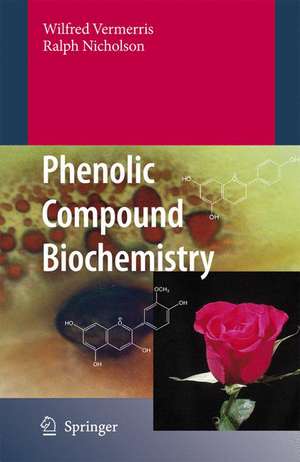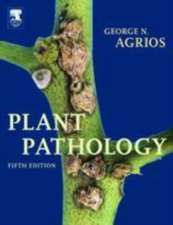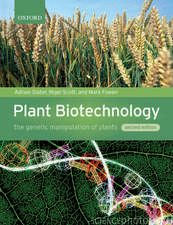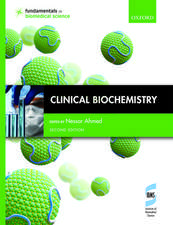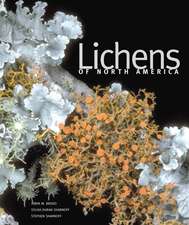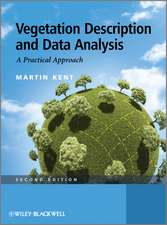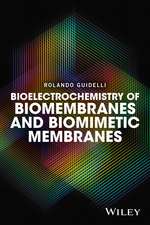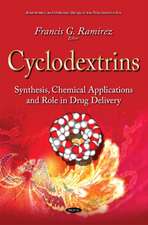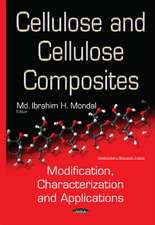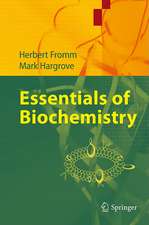Phenolic Compound Biochemistry
Autor Wilfred Vermerris, Ralph Nicholsonen Limba Engleză Hardback – 7 noi 2006
This book is written for researchers, instructors, advanced undergraduate students and beginning graduate students in the life sciences who wish to become more familiar with these and many other intriguing aspects of phenolic compounds. Topics covered include nomenclature, chemical properties, biosynthesis, including an up-to-date overview of the genetics controlling phenolic metabolism, isolation and characterization of phenolic compounds, phenolics used in plant defense, and the impact of phenolics on human health. The book is written in an accessible style, and assumes only basic knowledge of organic chemistry, biochemistry and cell physiology. More than 300 chemical structures and reaction schemes illustrate the text.
Wilfred Vermerris is Associate Professor of Agronomy at the University of Florida Genetics Institute in Gainesville, FL. His research focuses on the genetic control of phenolic compounds that impact agro-industrial processing of crop plants.
Ralph Nicholson is Professor of Botany and Plant Pathology at Purdue University in West Lafayette, IN. He is an expert on phenolic compounds involved in the plant’s defense against pathogenic fungi and bacteria.
| Toate formatele și edițiile | Preț | Express |
|---|---|---|
| Paperback (1) | 640.06 lei 6-8 săpt. | |
| SPRINGER NETHERLANDS – 14 oct 2008 | 640.06 lei 6-8 săpt. | |
| Hardback (1) | 648.89 lei 6-8 săpt. | |
| SPRINGER NETHERLANDS – 7 noi 2006 | 648.89 lei 6-8 săpt. |
Preț: 648.89 lei
Preț vechi: 763.40 lei
-15% Nou
Puncte Express: 973
Preț estimativ în valută:
124.18€ • 129.17$ • 102.52£
124.18€ • 129.17$ • 102.52£
Carte tipărită la comandă
Livrare economică 14-28 aprilie
Preluare comenzi: 021 569.72.76
Specificații
ISBN-13: 9781402051630
ISBN-10: 1402051638
Pagini: 292
Ilustrații: XII, 276 p.
Dimensiuni: 155 x 235 x 24 mm
Greutate: 0.65 kg
Ediția:2006
Editura: SPRINGER NETHERLANDS
Colecția Springer
Locul publicării:Dordrecht, Netherlands
ISBN-10: 1402051638
Pagini: 292
Ilustrații: XII, 276 p.
Dimensiuni: 155 x 235 x 24 mm
Greutate: 0.65 kg
Ediția:2006
Editura: SPRINGER NETHERLANDS
Colecția Springer
Locul publicării:Dordrecht, Netherlands
Public țintă
ResearchCuprins
Families of Phenolic Compounds and Means of Classification.- Chemical Properties of Phenolic Compounds.- Biosynthesis of Phenolic Compounds.- Isolation and Identification of Phenolic Compounds.- Analysis of Phenolic Compounds with Mass Spectrometry.- The Role of Phenols in Plant Defense.- Phenolic Compounds and their Effects on Human Health.
Textul de pe ultima copertă
These are just a few examples that illustrate the chemical diversity and use of phenolic compounds, the topic of ‘Phenolic Compound Biochemistry’.
This book is written for researchers, instructors, advanced undergraduate students and beginning graduate students in the life sciences who wish to become more familiar with these and many other intriguing aspects of phenolic compounds. Topics covered include nomenclature, chemical properties, biosynthesis, including an up-to-date overview of the genetics controlling phenolic metabolism, isolation and characterization of phenolic compounds, phenolics used in plant defense, and the impact of phenolics on human health. The book is written in an accessible style, and assumes only basic knowledge of organic chemistry, biochemistry and cell physiology. More than 300 chemical structures and reaction schemes illustrate the text.
Wilfred Vermerris is Associate Professor of Agronomy at the University of Florida Genetics Institute in Gainesville, FL. His research focuses on the genetic control of phenolic compounds that impact agro-industrial processing of crop plants.
Ralph Nicholson is Professor of Botany and Plant Pathology at Purdue University in West Lafayette, IN. He is an expert on phenolic compounds involved in the plant’s defense against pathogenic fungi and bacteria.
This book is written for researchers, instructors, advanced undergraduate students and beginning graduate students in the life sciences who wish to become more familiar with these and many other intriguing aspects of phenolic compounds. Topics covered include nomenclature, chemical properties, biosynthesis, including an up-to-date overview of the genetics controlling phenolic metabolism, isolation and characterization of phenolic compounds, phenolics used in plant defense, and the impact of phenolics on human health. The book is written in an accessible style, and assumes only basic knowledge of organic chemistry, biochemistry and cell physiology. More than 300 chemical structures and reaction schemes illustrate the text.
Wilfred Vermerris is Associate Professor of Agronomy at the University of Florida Genetics Institute in Gainesville, FL. His research focuses on the genetic control of phenolic compounds that impact agro-industrial processing of crop plants.
Ralph Nicholson is Professor of Botany and Plant Pathology at Purdue University in West Lafayette, IN. He is an expert on phenolic compounds involved in the plant’s defense against pathogenic fungi and bacteria.
Caracteristici
Provides a broad, general picture of the role and complexity of phenolic compounds Is written in a way that should be accessible to people with basic rather than advanced knowledge of organic chemistry and biochemistry Contains several hundred chemical structures to illustrate the tremendous structural diversity of plant phenolic compounds
